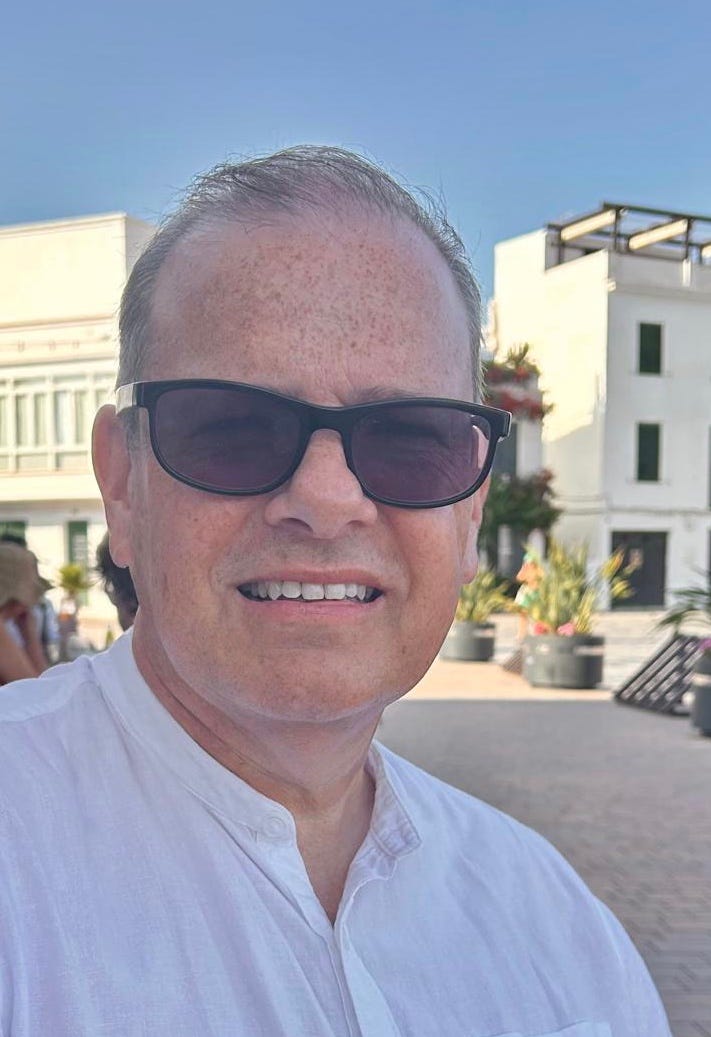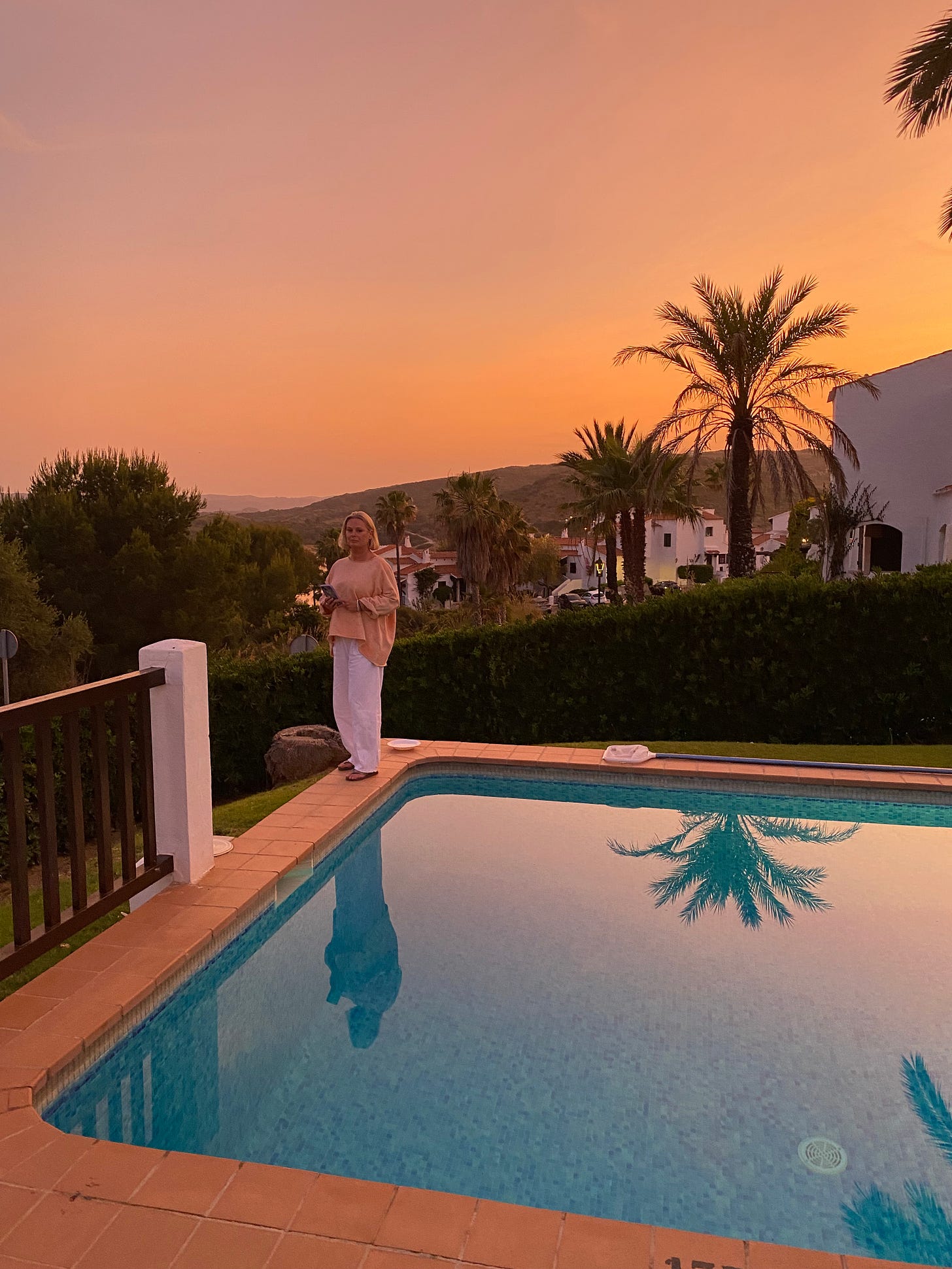This week you find me in Minorca.
So it’s a bit of an eclectic smorgasbord this week, but it’s served fresh!
The sun is shinning, the pool looks inviting and I am reading.
Holidays are a time to let go and reflect, it’s been quite a movement the last few years - cancer, cancer treatment, finishing my main career and the move to Dorset. All these things are of one piece, all moments of meaning on my golden string, all leading to NOW!
I have sustained a weekly sub-stack and slowly grown my kind readers. I am still beavering away on my novel, ‘The Dance of Shiva’ and was grateful for a proof read from my pal, Dr Steven Roberts, the best read man I know, and let’s be honest I know a few! So there is some work to do.
The short stories have dried up a bit, but a couple of poems have surfaced. I have also been working hard at home on the garden which is looking lovely. Philosophically I have had a few pieces published locally and a few connections, not least a Monday Story Telling Group in the Community Orchard.
There’s been some great education work; delivering a course on Middle Leadership for 12 Teachers in Romania which was a delight and tutoring two your men for their GCSE English exam. This scratched my teaching itch. Great lads and throughly enjoyable; I particularly enjoyed revisiting ‘Romeo and Juliet’ (what a play that is) and ‘A Christmas Carol’. Never been much of a Dickens fan, but my goodness he is a skilful writer. I also have quite a lot of possible work in September, which is exciting.
It’s impossible not to keep ‘giving’ and serving the need.
Mythically speaking it is always about the ground of our being- we are a ‘given’ freely creature. We owe everything on every level - parents, friends, even children, the cosmos, life itself and God.
Because we are ‘given’ we are called upon ‘to give.’
The Parable of the Talents.
This is our mythical energy in action.
We can give - consciously or unconsciously.
I try to make my giving conscious with an exchange of energy.
This is the creative, imaginative, principle.
We literally give back our life.
A virtuous circle.
Soulful replenishment.
Eat or be eaten.
On this break away I have been reading Cynthia Bourgeault’s book, ‘Eye of the Heart’. This has really chimed with me. She has a background with the Gurdjieff teaching and Mysticism which accords with me. I was also very interested in her exploration of the chiastic pattern and also the lectio divina practice of reading and contemplation. This is very similar to what I learnt with my first teacher, Micheal Bonfield and later refined by Dr Joseph Milne. Certainly I have been studying the same texts and writers for the last thirty years or more, so a real depth study. Shakespeare, Blake and Yeats most of all.
Certainly, some of this approach to reading all came my way from my time in the School of Economic Science (Reading, in Berkshire, Branch). This was an organisation set up by Leon Mclaren but led in this branch by Philip Marvin, another lover of Shakespeare.
The founder of the School, Leon MacLaren (1910-1994), was asked at a meeting about the right use of the mind in studying the scriptures.
‘The right use of the mind in relation to the scriptures, or indeed for that matter to anything else, is to fall quite still, attend to what is being spoken or shown or enacted, fully, with no idea about it at all; then the mind, being open and free, receives a true impression of what is being said or shown or enacted; and that being received simply and truly, the mind has been properly used.
And in the case of the Upanishads, for example, or the Gita or the Christian scriptures, the Gospels, in any case like that, it’s the same, the mind quite still and let the words sound; reading them is no good, let the words sound, you can sound them out loud if you like, but let them sound without any pre-judgement or any notion that you know what they mean, anything of this kind, so the mind is quite open and free.
That is the right use of the mind.
Now like this, in all circumstances, that is the right use of the mind, to be totally receptive; then you will find the mind, from its own nature, responds to the situation. But that response is only possible because the mind has been quite still, quite open, and has received the words or the showing or the activity just as it appears this is most fruitful.
And that is the right use of the mind; it will show you, for example, that the people you think you know well, you don’t know well at all, because every time that they walk through the door they’re different, and this idea that they are always the same is something that the mind has been putting on them – it‘s not true.
And if the mind is truly free and open, it will observe that every time the person who walks through the door is different, and it’s that you receive, that you respond to. It is very beautiful and very simple, but it does depend on having recourse to an inner stillness, which is always there, so that you can just attend, just that. And that is the right use of the mind, and you’ll find it very fruitful because it’s the need of the other person that brings forth from your mind what that person needs: you don’t need anything, you’ve got everything, so you’re all right.’
And also these levels of a text are useful:
Anagogic : the innermost or spiritual level;”Spiritual elevation or enlightenment, especially to the understand mysteries;ie the ability to lead the mind from the world of appearances to the contemplation of the divine order.”
Moral/Tropological: text understood in a way that is relevant to our own lives, reflecting a law directly related to human beings
Allegorical: each element of text understood as standing for, or being symbolic of something else, reflecting a universal law or principle of nature
Literal: Text taken at face value
The other thing this Substack has allowed me to do is publish exerts from my biography and I thought you might enjoy this, I am now at the Forest Grammar School near Reading aged 13:
Boys are physical, and they were certainly more physical in this era; casual bullying was rife, and the law of the jungle won out. Most days, one was punched or kicked and went home with bruises. I was never much of a fighter, but I am also proud that I never backed down. A tall boy called Richard Price, whom I quite liked, would hit us, but somehow, we didn’t mind. Curtis Brown used to head butt me and he was my friend. You knew to be wary of the stairwell because people would ‘Gob’ on you from above.
Toward the end of Year 6, I met Clive. A tall, blonde boy, some six feet and a keen rugby player, Clive began to walk past our bungalow in the morning in his blue Forest Uniform. His family had moved to Winnersh and were living on Mole Road. We soon became friends, and I found myself walking to school in the mornings with him.
Clive was a popular character, and being his mate did me no harm. He was very strong, and I started to hang around with him and another curious character called Julian Pearson. We all loved drama and were keen to be in school plays, Clive also had a good singing voice. I remained terrible at Maths and was in the lowest set with one of Clive’s other mates, Harvey Jones, who also loved Bowie.
Year 9 was a transitional year. The school was seeing some change. A new Deputy Head called Mr Morrish with his steel-rimmed glasses and very flamboyant jackets in bright colours. The challenge for him was that he looked identical to the leading actor in as programme called ‘Secret Army’, who played a Nazi called ‘Kessler’. This is what we called him. ‘Kessler’ would also appear in The Sun newspaper, and the older boys made numerous copies of the articles and accompanying pictures and stuck them up around the school. This was all highly amusing.
My friendship group blossomed, and many of Clive’s friends became my pals too. In the Winter, we would play cricket in the gym, with tennis balls and skittles as wickets a couple of lunch times each week. I enjoyed this. There were two tremendous batsmen in our year: Nigel Hawkes and Alistair Nicholson, who both opened the batting for Berkshire. Neither was academically able, but they were very natural, and both played for Hurst. My batting was still based on a very defensive mindset, where the other boys would be smashing balls everywhere. Playing allowed me to meet other boys and share this common interest. It was the only sport I ever really loved and excelled at. The energy of this school suited me, and there was much that delighted me. It was here I truly understood the power of education.
Come the summer, I was pleased to be in the cricket team. I opened the batting on a few occasions and managed to stay in while our two-star batsman scored heavily. I remember Andrew Davis and Phil Oxley bowling, but not any of the results. Phil became a friend and we played together at Embrook for a bit and our paths often crossed, he went on to have trials for Kent and played for Berkshire. Out of school, I was still playing for Emmbrook, but on Monday nights,I started to get the train down to Wokingham to receive some coaching from Tony Woolet, who had played for Kent. He was also left-handed like me. I remember going into the nets, and although I was not playing any scoring shots,the others were not able to get me out. More than anything, I wanted to be good at cricket, and I loved batting. Tony praised me and I developed a strong technique that would stand me in good stead.
At the end of Year 9, we chose our options for O Levels and CSE’s; things were starting to get serious now! Although we didn’t realise it at the time. I have always felt that these exams come at a bad time, just as you are going through adolescence, and hormones are flooding your system.
Finally a poem:
What Remains? The frozen forms of people creates a picture on the beach. It’s enough to stop our roving and makes the horizon speak. Tired of the sunlight the eye returns to forms, creating a mosaic, for which imagination yearns. We now return to the moment, despite the sun and sea. The moment we stood, silently, you looking at me.
That’s it for this week folks.
Enjoy,
David






